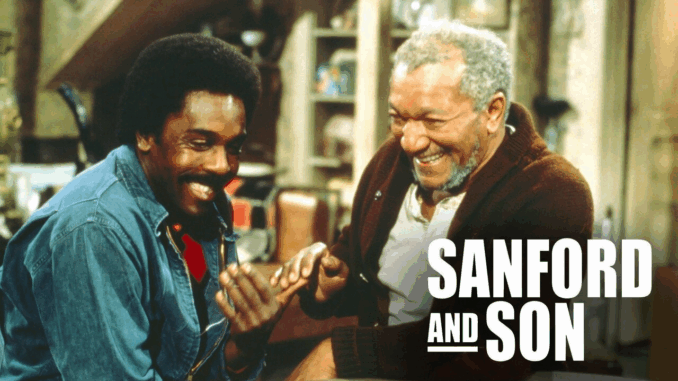
On September 14, 2002, the world lost a true comedic force, a cultural icon whose sassy one-liners and formidable presence left an indelible mark on television history. LaWanda Page, the legendary actress and comedian best known as the Bible-toting, purse-swinging Aunt Esther on the classic 1970s sitcom Sanford and Son, passed away at the age of 81 due to complications from diabetes.
While her beloved television character was defined by church-going piety and a staunch moral compass, the real LaWanda Page, born Alberta Peal (or Alberta Richmond), possessed a far bawdier, trailblazing career. From the tough stages of the “Chitlin’ Circuit” to prime-time television, Page’s journey is a testament to perseverance, friendship, and the power of a perfectly timed put-down.
As we mark the anniversary of her passing, we celebrate the life of a performer who was, in every sense of the word, “The Queen of Comedy.”
From “Bronze Goddess of Fire” to Blue Comedy Queen
Long before she ever uttered “Watch it, sucker!” on NBC, LaWanda Page was a seasoned veteran of the stage. Her show business career began decades earlier, performing on the difficult, segregated circuit of nightclubs known as the Chitlin’ Circuit.
The Fire Dancer
In her early days, Page was a dancer and magician’s assistant, famously billed as “The Bronze Goddess of Fire.” Her act involved daredevil stunts, including eating fire and walking across hot coals—a dangerous, high-energy performance that showcased her fearlessness and magnetic stage presence.
The Rise of “Blue Comedy”
By the 1960s, Page transitioned to stand-up comedy, where she found her true voice. Her material was known as “blue comedy”—raw, often raunchy, and definitely adults-only. She recorded several popular, gold-selling comedy albums for the Laff Records label, cementing her reputation as one of the fiercest, funniest, and most boundary-pushing female comedians of her era.
This is where her lifelong friendship with Redd Foxx (born John Elroy Sanford) became crucial. They had known each other since childhood, having grown up together in St. Louis. Both were giants of the underground comedy scene, mastering the art of the witty, profane, and observational comedy that thrived outside of the mainstream.
Redd Foxx’s Ultimatum: The Birth of Aunt Esther
When Redd Foxx was cast as the lead in Sanford and Son in 1972, he knew exactly who he wanted to play his most antagonistic family member: his old friend, LaWanda Page.
A Difficult Sell
The show’s producers, notably Bud Yorkin and Norman Lear, were initially hesitant. Page, an actress with limited mainstream experience, was a risk. However, Redd Foxx was unyielding. In one of the most famous behind-the-scenes stories in TV history, Foxx reportedly issued an ultimatum: “If she doesn’t go, I go.”
The producers relented, and the character of Esther Anderson, the sister of Fred Sanford’s deceased wife, Elizabeth, was born.
The Best Rivalry in TV History
The tension between Fred Sanford and Aunt Esther quickly became the heart and soul of the show, delivering some of its most iconic moments and biggest laughs. Their insults—a constant volley of biting, yet affectionate, signifying—are legendary:
- Fred to Esther: “I’m coming to join ya, Elizabeth! I’m coming to join ya!” (Followed by a classic fake heart attack).
- Fred’s Insults: Fred would frequently compare Esther to various monsters and unsightly creatures, famously calling her a “fish-eyed fool,” a “big-foot monster,” or asking, “Who’s that ugly woman on my porch?”
- Esther’s Rebuttals: Aunt Esther, armed with her Bible (which she occasionally used as a weapon), would retort, “You old heathen!” or deliver the iconic line, “Watch it, sucker!”
Their shared history on the comedy circuit allowed Page and Foxx to improvise and deliver their lines with a genuine, combative chemistry that could not be replicated. The character of Aunt Esther, the self-righteous deaconess, was a brilliant counterpoint to the raunchy, secular Fred, making the show’s comedy genius a fascinating blend of sacred and profane.
LaWanda Page’s Enduring Influence
Though her most famous role ended when Sanford and Son wrapped in 1977, Page continued to work, often reprising the Aunt Esther character in the short-lived spinoffs Sanford Arms and Sanford. She also became a familiar, welcome face in many other projects, showing her versatility and enduring appeal to a new generation of fans.
- 1990s Sitcoms: Page appeared on shows like Martin (with Martin Lawrence) and 227, often playing variations of the sassy, no-nonsense matriarch.
- Film Cameos: She had memorable big-screen appearances, including a role in Ice Cube’s classic film Friday (1995), proving her humor was timeless and cross-generational.
In a poignant parallel to her religious character, LaWanda Page became an ordained evangelist later in life, merging her faith with her public platform. Her career arc—from a fire-eater in raunchy clubs to a beloved deaconess on TV to a literal evangelist—is one of the most unique in entertainment history.
Her Legacy: Beyond the Laughs
On the day of her death, LaWanda Page was remembered not just as a comedian, but as a groundbreaking performer. She was a Black female artist who dominated a historically male and restrictive genre (blue comedy) and transitioned that success into a beloved, iconic television role, standing shoulder-to-shoulder with her childhood friend, Redd Foxx.
Her health struggles in her later years, a battle with diabetes that eventually led to a fatal heart attack, highlight the quiet struggles behind the immense talent. Yet, the laughter she created remains her strongest legacy. Every time a fan watches a clip of the famous Fred vs. Esther showdown, Page’s memory is honored.
The next time you see that fierce, scowling face, Bible in hand, ready to deliver a righteous verbal beatdown, remember the woman behind the glasses: LaWanda Page—the Fire Goddess, the Blue Queen, and the greatest sister-in-law to ever grace a junkyard.